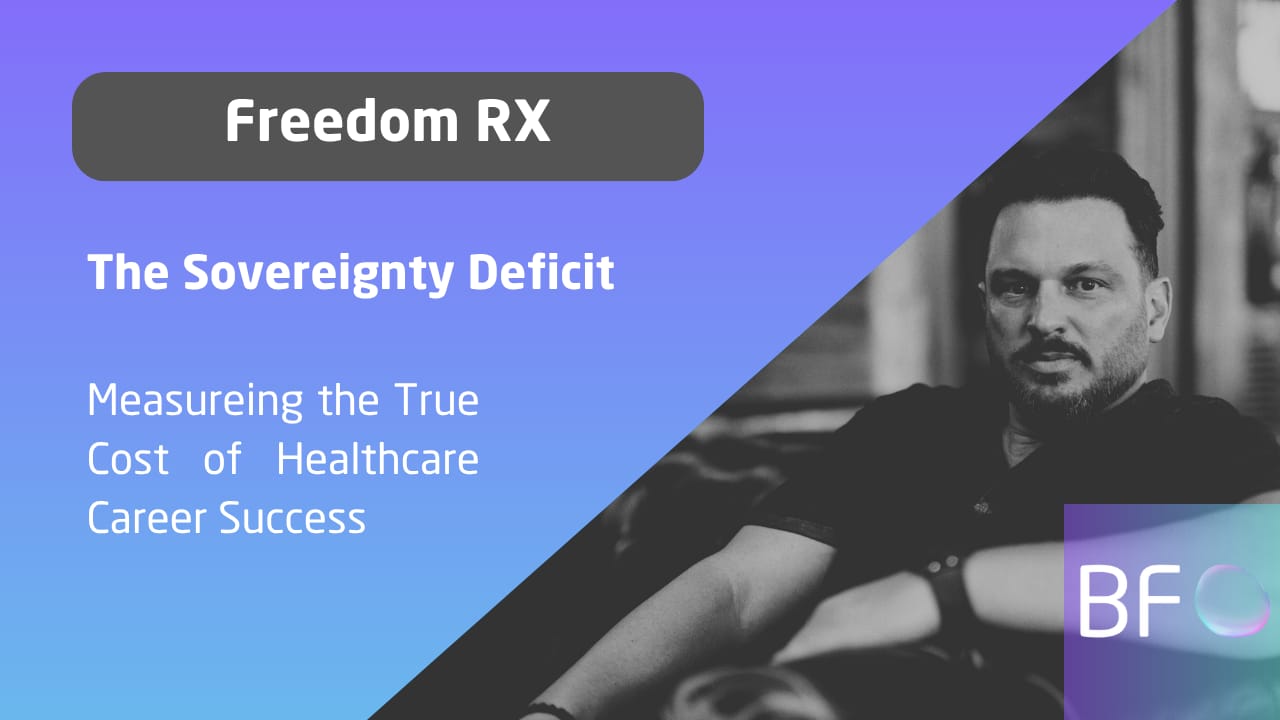A 6-minute read for Physicians, Healthcare Executives, and Medical Device Professionals seeking to understand and reclaim their professional autonomy
When Dr. Sarah, a highly respected neurologist, reached the pinnacle of her career—department chair at a prestigious academic medical center—she experienced something unexpected: a profound emptiness. Despite checking every box on her professional checklist, she felt more constrained than ever.
"I have less control over my schedule now than when I was a resident," she confided. "My expertise has become a prison."
Her experience isn't unusual. It represents what I call the Sovereignty Deficit—the inverse relationship between professional achievement and personal freedom that afflicts healthcare's most accomplished minds.
After spending nearly two decades in healthcare, from negotiating in hospital C-suites to standing alongside surgeons in operating rooms, I've witnessed this pattern repeatedly: The more expertise you develop, the less freedom you experience.
But what if there was a way to measure this deficit precisely? To understand exactly what your career advancement is costing you in terms of autonomy, time, and fulfillment?
The True Cost Accounting Framework
Most healthcare professionals track their career progress through conventional metrics: title advancements, salary increases, publication counts, or patient load. But these measurements tell only half the story.
Here's a more comprehensive accounting system that reveals what's actually happening as you climb the healthcare ladder:
1. Time Sovereignty Measurement
Traditional success metrics focus on income or status, but they fail to account for time—the only truly non-renewable resource. Consider tracking:
Decision Control Ratio: What percentage of your daily schedule can you actually control? For many physicians, this number drops from about 60% during training to less than 20% at senior levels.
Schedule Autonomy Index: How many days in advance must you request time off? How often are these requests denied? Many healthcare executives I've worked with must plan vacations 6-12 months in advance, with cancellations becoming increasingly common as they advance.
Presence Percentage: What proportion of significant family moments have you missed due to work constraints in the past year? One cardiac surgeon I know missed 11 of his daughter's 12 soccer games last season despite being considered "successful" by every conventional metric.
Your knowledge should serve your vision, not just institutional objectives:
Self-Direction Quotient: What percentage of your expertise is deployed toward projects you personally find meaningful versus those mandated by others?
Impact Ownership Measurement: Do you control how your expertise creates value, or has that control been outsourced to administrators, regulations, or systems?
Innovation Permission Factor: How many layers of approval stand between your ideas and their implementation? One healthcare executive shared that this number increased from 2 to 9 as she advanced in her career.
3. Professional Identity Constraint Analysis
Success often comes with unexpected identity restrictions:
Expression Limitation Scale: How freely can you share your authentic professional opinions without fear of political, administrative, or reputation consequences?
Decision Protocol Constraints: How many treatment or business decisions must follow predetermined protocols rather than your professional judgment?
Compliance Burden Measurement: What percentage of your working hours is spent on documentation, administrative tasks, and compliance activities versus direct value creation?
The Alarming Mathematics of the Sovereignty Deficit
When we apply this accounting framework, we discover something startling: For many healthcare professionals, each step up the traditional career ladder creates a 15-25% reduction in overall sovereignty while increasing income by only 10-15%.
This creates a dangerous equation: By mid-career, many healthcare professionals have traded away 60-70% of their autonomy for a 30-50% increase in compensation.
Is it any wonder that burnout, disillusionment, and quiet desperation have become epidemic among healthcare's most accomplished minds?
Reversing the Sovereignty Deficit
The good news is that once measured, the deficit can be addressed. Consider these initial steps:
Conduct Your Sovereignty Audit: Use the framework above to honestly assess where you stand. Measurement creates awareness, and awareness enables change.
Redefine Success Metrics: Begin evaluating career opportunities not just by compensation or prestige, but by their sovereignty implications. How will this new role or responsibility affect your time control, deployment discretion, and identity expression?
Create Boundary Protocols: Develop and communicate clear parameters around your time, attention, and availability. Remember that boundaries aren't selfish—they're essential for sustainable excellence.
Explore Sovereignty-Enhancing Models: Investigate practice structures, business arrangements, or career pivots that increase control without sacrificing impact or income.
The Sovereignty Restoration Principle
The most important insight from my years working with healthcare professionals is this: Sovereignty isn't an either/or proposition. You don't have to choose between success and freedom.
The key lies in creating systems that leverage your expertise to automatically generate value, influence, and income without requiring your direct time investment.
When structured correctly, these systems allow you to reclaim sovereignty while simultaneously expanding your impact and often increasing your compensation.
Consider Dr. Thomas, an orthopedic surgeon who measured his sovereignty deficit and discovered he had less than 10% schedule control despite earning over $800,000 annually. By implementing strategic sovereignty restoration systems, he now maintains his clinical income while reclaiming 20 additional hours weekly and complete control over his schedule.
The journey begins with honest accounting. Once you measure your sovereignty deficit, you can begin the work of closing it—creating a career that offers both the external success and internal freedom you deserve.
